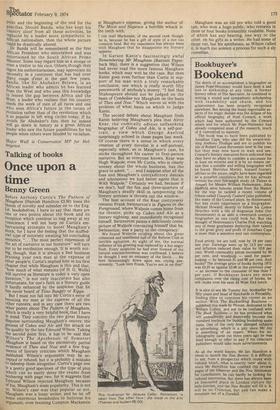Bookbuyer's
Bookend
The death of so accomplished a biographer as James Pope-Hennessy would have been a sad loss to authorship at any time. A former literary editor of The Spectator, he combined in writing a sound and sympathetic scholarship with readability and charm, and his achievement has been properly recognised elsewhere. But among the many regrettable aspects of his tragic demise was the eclipse of his official biography of Noel Coward, a work which had been authorised by the Coward estate and for which Mr Pope-Hennessy had already completed most of the research, much of it committed to memory.
The book was to have been published by Jonathan Cape, who also did his award-winning Anthony Trollope and are to publish his life of Robert Louis Stevenson later in the year, but they may now have to wait and see. Coward's literary executors have indicated that they have no plans to consider a successor for at least six months and it is by no means certain that a suitable and willing biographer will be found. Sheridan Morley, himself literary adviser to the estate, might have been regarded as a possible candidate but he has already written his own full-length study (A Talent to Amuse) for Messrs William Heinemann. John Hadfield drew fulsome praise from the Master for the way he tackled a recent volume of tribute called Cowardy Custard (also published, like many of the Coward plays, by Heinemann) but has scant experience as a biographer. Michael Howard, shortly to follow his Lytton Strachey with a life of Augustus John (for Heinemann) is as able a twentieth century biographer as one could look for. But the thought of Heinemann's Charles Pick watching any of these gentlemen deploying their talents to the great glory and profit of Jonathan Cape is more than a sensitive soul can contemplate.
Food prices, we are told, rose by 19 per cent last year. Earnings went up by 12.5 per cent and inflation reduced their value by 10.6 per cent. World commodity prices increased by 50 per cent, and woodpulp — used for papermaking — by between 51 and 66 per cent. And books? The average price of books during 1973 was £3.25 as against £3.06 in the previous yearan increase to the consumer of less than 7 per cent. If Bookbuyer hears any more complaints over the rising cost of books, he will choke over his next £4 West End lunch.
It is nice to see Mr Tommy Joy, bookseller for fifty years and head of Hatchards in Piccadilly, finding time to continue his career as an author. With The Bookselling Business — published this week by Pitman, dedicated to Sir William Collins, and not to be confused with The Book Business — he has produced what will undoubtedly and deservedly become the standard textbook for budding bookshop assistants. One of the very few skimped subjects is advertising, which is a pity since Mr Joy is something of an expert. When his autobiography came out three years ago he was kind enough to offer to pay if his reluctant publishers would take more advertisements.
As all the world knows, Mr Ian Hamilton is about to launch the New Review. It is difficult to see, from a prospectus which oozes with cultural kitsch, what is exactly 'new' about it; since Mr Hamilton has combed the review pages of the Observer and the New Statesman for contributors, he can hardly be looking for cultural innovation. But there has always been an honoured place in London culture for belle-lettrism, and the New Review will fill it. It will be no Criterion, but you can make a mountain out of a Cornhill.


































 Previous page
Previous page